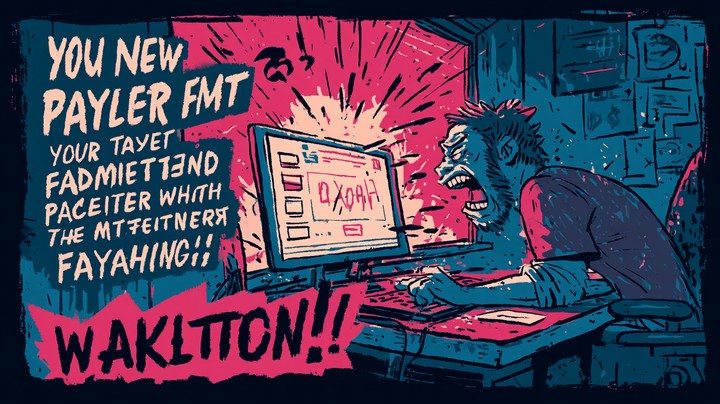When Employees Become Cogs: The Real Cost of ‘Not My Job’ Culture
At Companio, we reject the “Not My Job” culture. In a fast-moving startup, flexibility isn’t optional—it’s survival. The best teams thrive because they step beyond their job descriptions, adapt to new challenges, and embrace the unknown.

A few days ago, my COO forwarded a short, polite message to our Bulgarian accountant, confirming the decision to end her contract after just one month and thanking her for her time with us.
It caught me off guard. I immediately reached out to both my COO and the accountant to understand what had happened, hoping there was a way to address the issue before things reached that point.
Her reply came quickly, and before I even heard back from Miguel (our COO), the core of the problem was clear.
“[The COO] expects me to do the work of a lawyer, but I am a finance and accounting specialist.”
I’ve seen that same sentiment expressed countless times, in different words, but with the same underlying meaning:
“That’s not in my contract.”
“That’s not my job.”
The Multi-Hat CEO: Leading by Example
Those words—whether spoken directly or hidden between the lines—should be a red flag for any organization. They signal a rigid mindset where roles are narrowly defined, and personal contribution is limited to what’s written on paper.
In my role as CEO, co-founder, and board member of Companio, my job description might look clean and well-defined on paper. Reality, however, is far messier—and far more rewarding. Over the years, I’ve worn more hats than I can count, taking on responsibilities well beyond the traditional scope of a CEO.
I’ve stepped in as CTO, managing the architecture of our systems while leading the company. I’ve served as project manager, keeping timelines on track and ensuring cross-departmental alignment. I’ve been a developer—personally building the first two versions of our platform from scratch, and kickstarting the AI engine that now parses and processes invoices automatically.
I’ve managed engineers as IT Lead, taken calls and answered tickets as a customer support agent, handled accounting for smaller clients to understand our own processes inside-out (including bank reconciliation and invoice processing), and even rolled up my sleeves for content creation: writing blog posts, FAQs, marketing campaigns, and copy.
I’ve dabbled in web design, UI/UX, financial analysis, and administrative work. Of course, today we have a talented team in place to manage each of these areas. But even now, I still write code, manage projects, speak directly with customers, or create content when needed.
This isn’t just a story about versatility. It’s a culture statement: if the CEO can roll up his sleeves and get the dirty work done, everyone in the company should feel empowered—and expected—to do the same.
The Hidden Cost of the “Not My Job” Mindset
The story of our Bulgarian accountant isn’t an isolated case. I remember another instance with a customer support agent who refused to call a customer, claiming that “it’s not in my contract.” This was a CS agent. Picking up the phone and calling customers is one of the most basic, fundamental parts of the role.
The solution to this cultural problem isn’t to cram every conceivable task into a contract in a kind of “defensive hiring” approach. It’s to build a culture of flexibility and adaptability.
Of course, I’m not going to ask anyone to perform a job they’re unqualified for, dislike, or can’t reasonably handle. But in a tech startup, there’s a reasonable scope of related tasks that come with each role. If you’re an accountant, registering companies and managing their books is well within your wheelhouse.
Working at a startup is not the same as working at a massive corporation like Accenture. Yes, you gain benefits—fast-paced growth, flexibility, flat hierarchy, remote work—but those come with an unspoken agreement: you contribute flexibility and adaptability in return.
The “Not My Job” or “Not In My Contract” mindset doesn’t just slow things down. It kills innovation. It signals a deeper issue: a lack of adaptability, an unwillingness to help when the team needs you, and difficulty adjusting when the business pivots or the market changes. These traits are toxic for startups. They must be identified early and addressed systematically—not just to improve workflows, but to protect the culture that fuels the company’s growth.
Killing the “Not My Job” Culture
Startups—and especially digital, fast-moving companies—thrive on creativity, adaptability, and the willingness of people to step outside their comfort zones. In these environments, the most valuable team members are those who are multi-talented, curious, and willing to wear different hats when needed.
The first line of defense against the “Not My Job” culture starts during hiring. Be transparent with candidates from day one. Explain that flexibility is not just a nice-to-have—it’s a cornerstone of your company culture. Make it clear why adaptability matters, and how it directly impacts the success and growth of the company.
The second step is early detection. Employees who hold onto the “Not in my contract” mindset are like sand in the gears of a young company. If you identify someone with this attitude, you need to act quickly. It’s equally important to communicate openly with the rest of the team about why that decision was made. This isn’t about punishing individuals—it’s about protecting the culture and ensuring that the entire team can thrive without obstacles.
At Companio, “Not My Job” and “Not in My Contract” are immediate red flags. They trigger a conversation with the employee to see if there’s a misunderstanding or room for alignment. But, in most cases, these conversations end with a decision to part ways. Experience has taught us that people with this mindset rarely adapt to the pace and flexibility of a startup, even if they try to mask it at the beginning.
A thriving startup culture is built on ownership, not boundaries. When everyone is willing to go beyond the job description, the company moves faster, adapts quicker, and wins together.




Comments ()